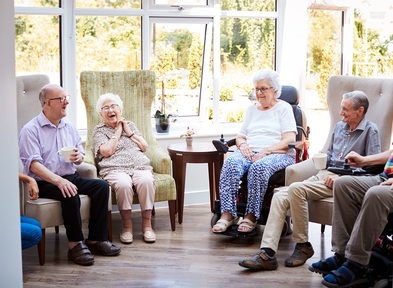Younger people want 'emotionally available staff' and 'autonomy' in their future care home, study finds
Living in a care home with "as much autonomy as possible" and connections to the "wider community" are just some of the responses generations X, Y and Z view future environments for older people, a new study shows.

Castleoak, a specialist development, construction & off-site manufacturing - for care & retirement living & affordable housing has partnered with the University of Oxford student consultancy to understand perceptions of care homes among generations X, Y and Z and how they view future environments for older people.
The student consultancy, which is a programme to support local organisations, conducted research over an eight-week period which revealed only one in six (15.7per cent) respondents had a positive perception of care homes.
Kate Still, chief operating officer at Castleoak, said: “It’s so important to include people from generation X, Y and Z in conversations about care so we don’t continue to be the forgotten sector.
“If we’re not talking to younger generations, they’re never going to give it a second thought and it’s going to continue to be low on the priority list. This is a direct barrier to innovation and to integrating care homes into our communities."
Findings from the research also included negative words which were prominently associated with ‘care homes’ including, ‘disabled’, ‘smell’, ‘isolated’, ‘removed’ and ‘cheap’. This contrasted greatly with words younger people wanted to think of in association to places they live as they get older, including ‘independent’, ‘home’ and ‘assisted’.
Ms Still added: “The average age of a start-up founder is early 40s, so as a sector we need to make sure we’re capturing the hearts and minds of people – like Oxford University students – before they reach this age to ensure we benefit from their talent and ideas.”
'As we get older we don’t stop being the same person'
The research project, which included a survey and focus group, aims to bring younger generations into the care home conversation as data from the Office for National Statistics suggests there will be an increasing number of older people as the proportion aged 85 and over is projected to double over the next 25 years.
The survey received 32 responses, while six people took part in the focus group. Following the research, the students made recommendations regarding how future care home environments could change these perceptions. Recommendations included promoting autonomy and individualism as well as moving towards multi-purpose buildings to better connect care homes with the wider community.
One recommendation included integrating childcare facilities to overcome the familial challenge associated with rising childcare costs and ageing grandparents.
The research also revealed some of the key factors that would give people piece of mind about moving into a care home. One in five (50 per cent) cited ‘quality of care’ as the most desired factor, followed by emotionally available staff (28 per cent), having family close by (25 per cent) and autonomy (25 per cent).
Charlotte Densmore, University of Oxford student who was the research lead for this project, says: “Hearing personal experiences from our participants made it clear that as we get older we don’t stop being the same person.
"We still want the same things: as much autonomy as possible, with appropriate levels assistance, to be able to express our individualism and live in a place which is our home, not a hotel, and to be genuinely connected with the wider community and with our families. Having access to social activities is important, but they shouldn’t be forced upon anyone.”
Other recommendations from the research included the need to create sustainable environments surrounded by green space and giving residents a sense of ‘going somewhere’ by having facilities that are integrated with the wider community.
Emerging themes were also identified including robotic care homes, AI diagnostics, autonomy-enabling technology and technology usability.
Ms Densmore added: “We need future care environments to take these things into account when care homes are being located and designed through to when they’re operational.
“I’m really glad that I was able to be a part of delivering this research because I now realise what an important topic it is for younger generations to be debating and I know other participants felt the same.”
To read the full reports, go to https://www.castleoak.co.uk/castleoak-university-of-oxford-research
Latest News
 29-Jul-24
Dementia Bus gives carehome.co.uk staff insight into life with dementia
29-Jul-24
Dementia Bus gives carehome.co.uk staff insight into life with dementia
 01-Mar-24
Find out the top care homes in 2024
01-Mar-24
Find out the top care homes in 2024
 21-Mar-23
UK's top care homes in 2023 revealed
21-Mar-23
UK's top care homes in 2023 revealed
 03-Jan-23
carehome.co.uk launches free care helpline
03-Jan-23
carehome.co.uk launches free care helpline
 13-Dec-22
5 mins with Emily Whitehurst, chief operating officer for Constantia Healthcare
13-Dec-22
5 mins with Emily Whitehurst, chief operating officer for Constantia Healthcare